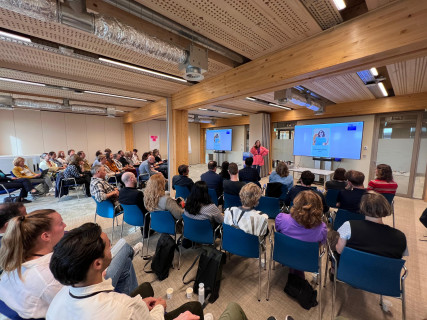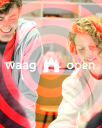On Tuesday October 10th, Amsterdam Smart City partners gathered for an afternoon full of inspiration, exchange and connection with each other at our 21st Demoday! This time, we were invited by our partner Alliander to their brand-new circular office in Amsterdam Westpoort. In this article, we give you a quick overview of the Knowledge Session, pitches and work sessions. Interesting in learning more? Read the full reports by our Programme Managers Noor, Pelle and Sophie (linked below).
About our Demodays
The Demodays are one of the tools we use to stimulate innovation and encourage connection between our partners and community. The purpose of the Demodays is to present the progress of various innovation projects, ask for help, share dilemmas and involve more partners to take these projects to the next level. More information about the Demodays can be found here.
Knowledge Session: Systems Thinking for Beginners
We started the Demoday with a workshop Systems Thinking for Beginners, led by Nico Schouten from Metabolic. In this workshop, he explained why it is important to take a holistic approach to sustainability challenges. If we don’t see “solutions” in the context of the whole system it might have bad unintended consequences. Curious to learn more about Systems Thinking and how you can map a system for sustainability and societal challenges? Read the full report here.
Pitches
After the Knowledge Session, we continued with four inspiring pitches. Titus Venverloo (AMS Institute) told us all about the Senseable Amsterdam Lab (SAL), a new research collaboration between AMS Institute and MIT that introduces novel data and science-based methods to help the City of Amsterdam transition to a carbon-neutral city. Beth Massa (Ozarka) is on a mission to replace single-use and on-the-go food packaging with reusable alternatives. She explained how she uses empathy in her journey to get her partners to become more circular. Gilles Hommen (ZEnMO Simulations) presented the HOLON Tool, designed to help shape the energy system of the future. And last but not least, Christine Groothuis (municipality of Haarlemmermeer) and Jadine van Ooijen (Digital Society School) gave an update on their finalised human-centric design project, which once started as an Amsterdam Smart City challenge. Check out the aftermovie of the final showcase from the Digital Society School for the final results!
Work sessions
Circular | Bringing Circularity to Small and Medium-Sized Business by Mariska Joustra (municipality of Amsterdam) and Gabrielle Werkhoven (Versnellingshuis)
Amsterdam is striving to make a substantial reduction in resource usage by 2030 and transition to a fully circular economy by 2050. Engaging Small and Medium-sized Businesses (SMBs) in this transition is essential, but managing this is difficult. Key insights from the city's circular ambitions and strategies, along with challenges faced by SMBs and potential solutions, were discussed in this work session and are highlighted in this report.
Energy | How to share learnings of local energy systems and form a coalition | Omar Shafqat (HvA)
When thinking about the decarbonization of cities, Local Energy Systems (LES) are often mentioned as one of the key enablers in the future. While there is agreement that LES have a role to play in the energy system of the future, what exactly this role is and how to scale up and implement this solution remains unclear. In this work session, Omar Shafqat (HvA) presented a framework for sharing the learnings of LES and we discussed how we can further develop this framework and how to form a coalition between different parties that work on LES. You can read the full report here.
Digital | Digital Identity & Awareness
When using digital government services, we often leave more data behind than is actually necessary. The municipality of Amsterdam recently completed a pilot with Yivi (formerly IRMA), a safer and more reliable way of logging in that doesn't request or store unnecessary information. During the Transition Day in June, we identified that a lack of awareness and knowledge about digital identity and privacy risks is one of the main barriers for implementing new electronic identification methods. In this follow-up session, we continued with the theme of awareness and asked the Amsterdam Smart City network to come up with a change story and (start of) a campaign about digital identity. Read the full report here.
General | Value Mapping practice with CIRCOLLAB
CIRCOLLAB, a network in the Metropolitan Region of Amsterdam aimed at accelerating the circular transition, is developing a method to apply systems thinking and eco-centric approaches in organisations. While developing the right workshop methods, they are hosting meet-ups to discover what it takes for organisations to look beyond their organisational boundaries and feel part of the larger system. In this worksession, our Demoday participants were invited to apply value chain- and systems thinking within a Almere Pampus case, and articulate their feedback on the workshop methods. You can read the full report here.





